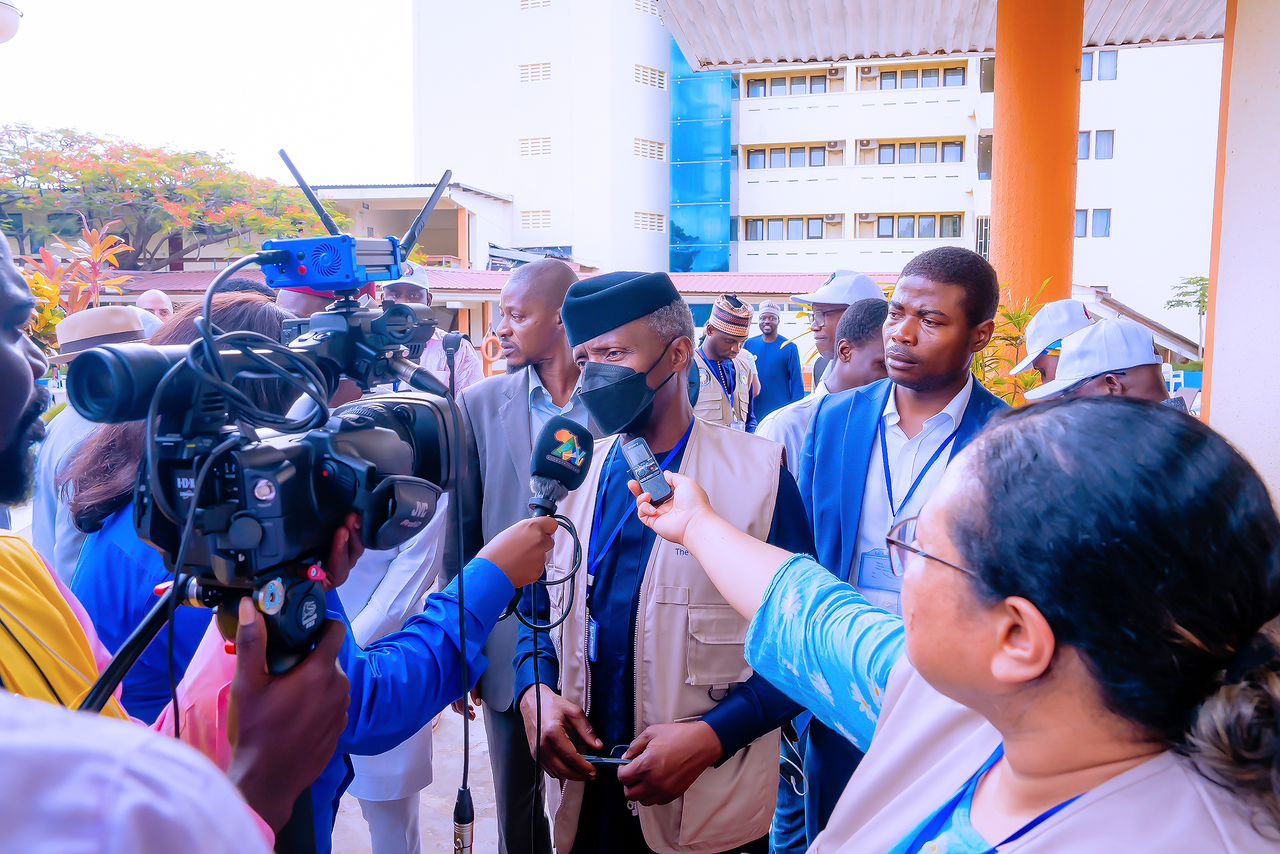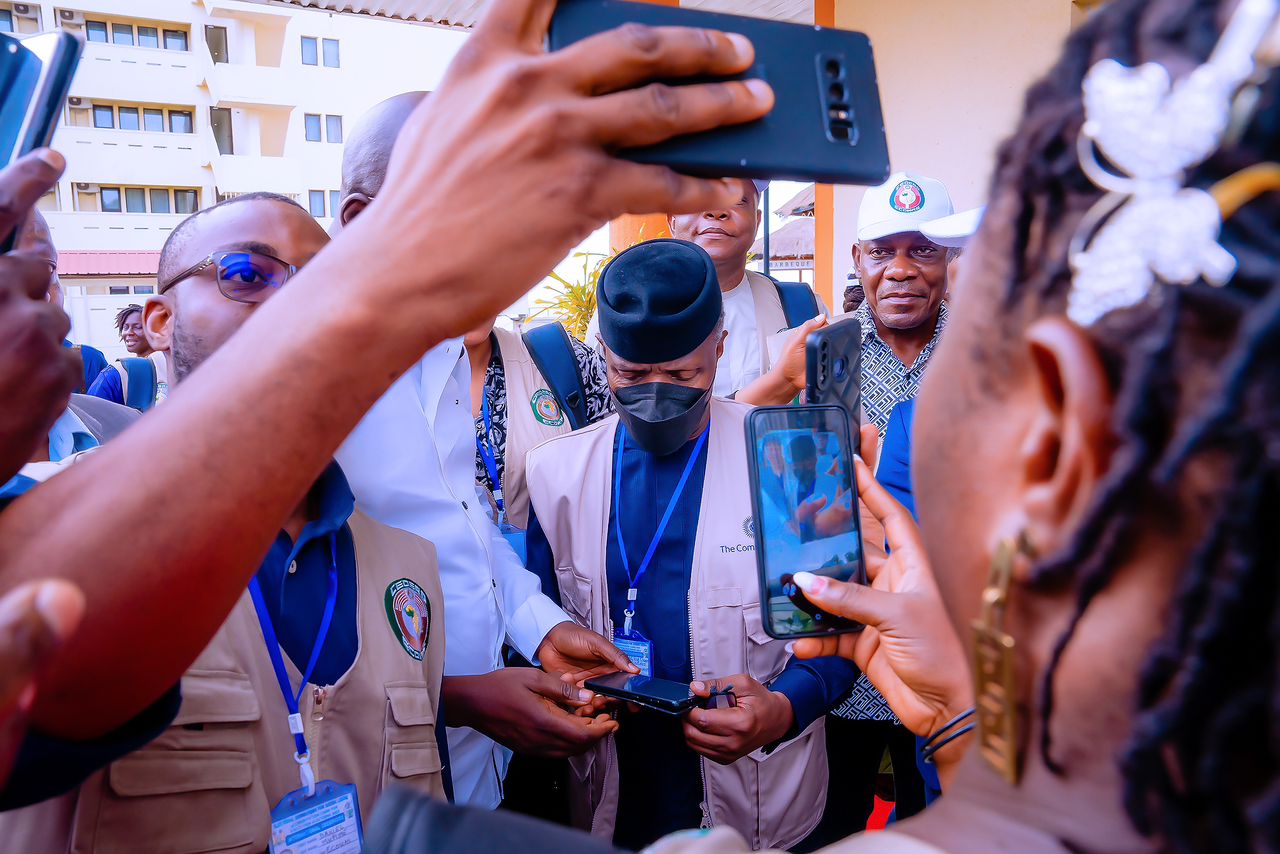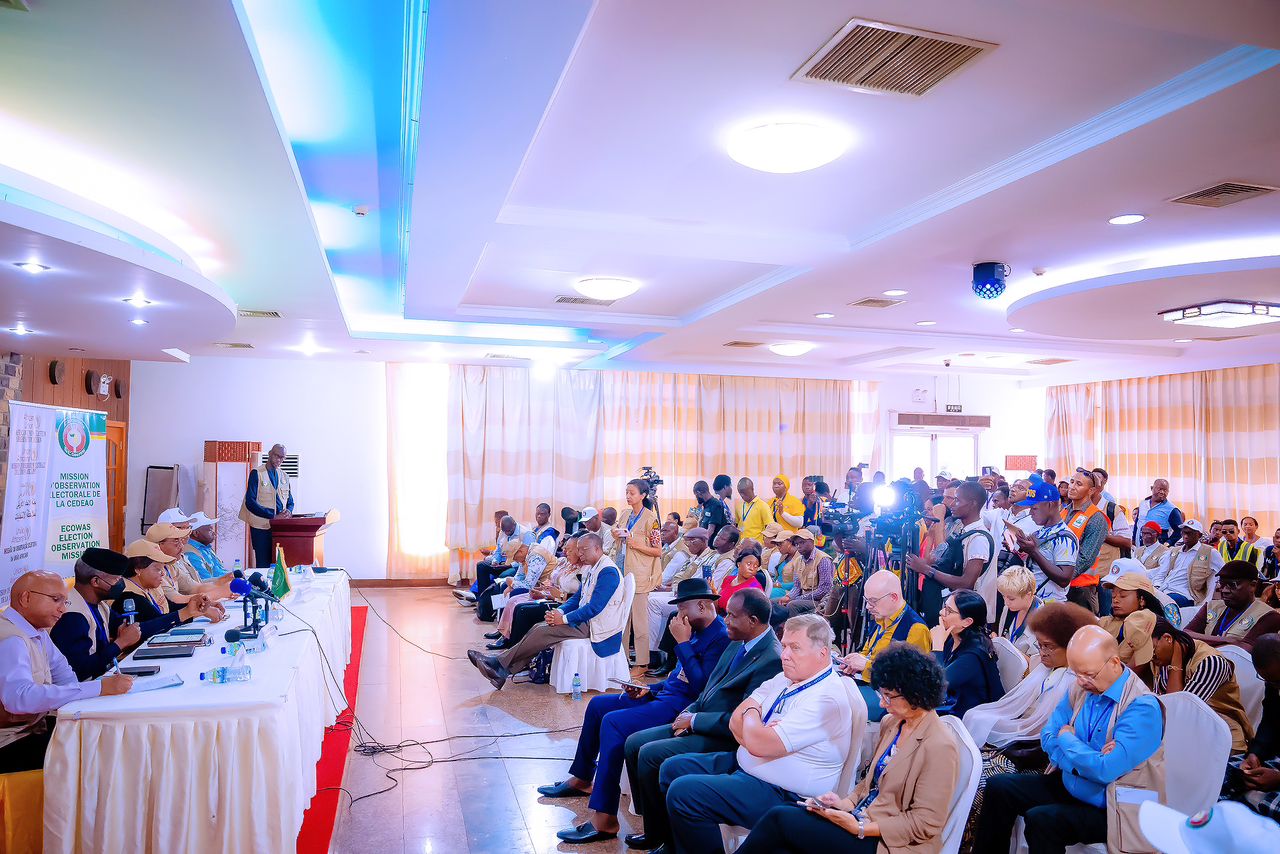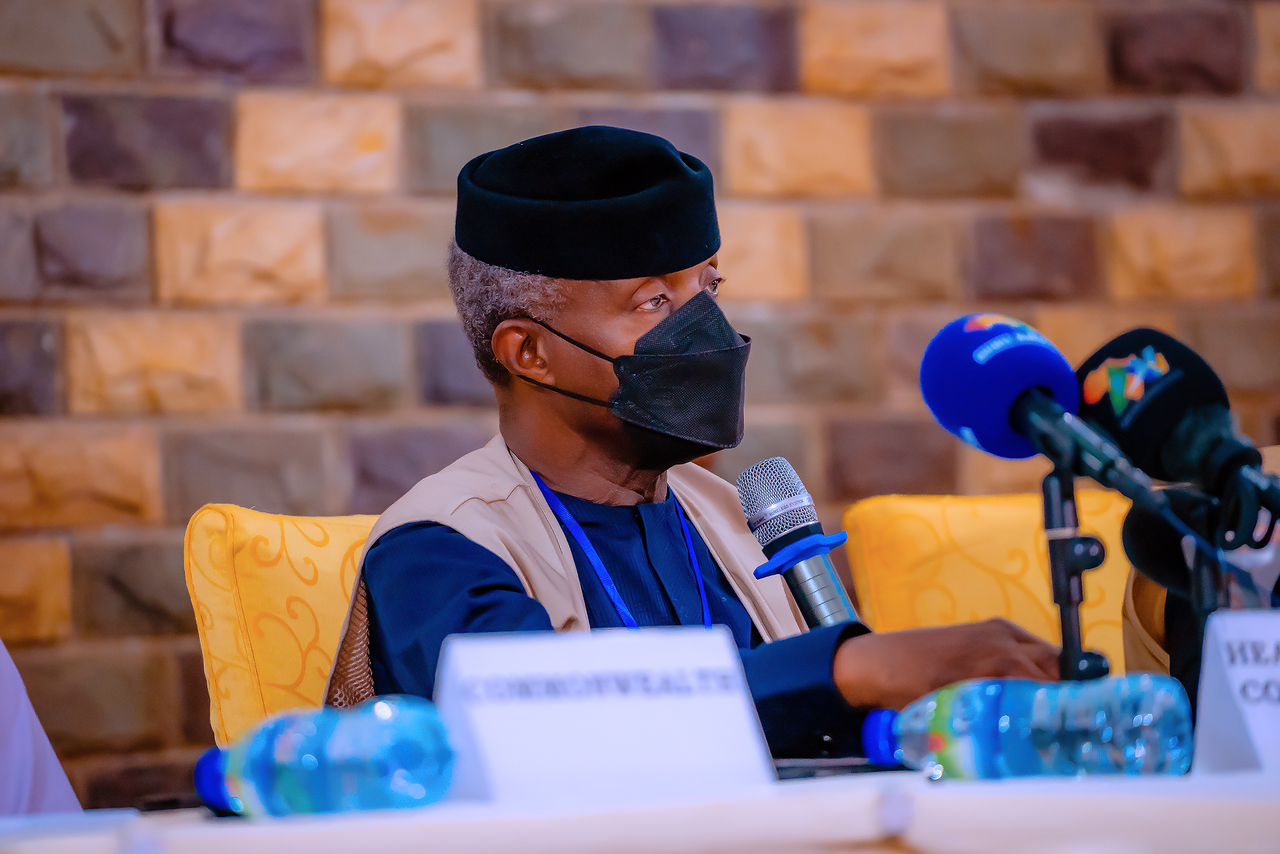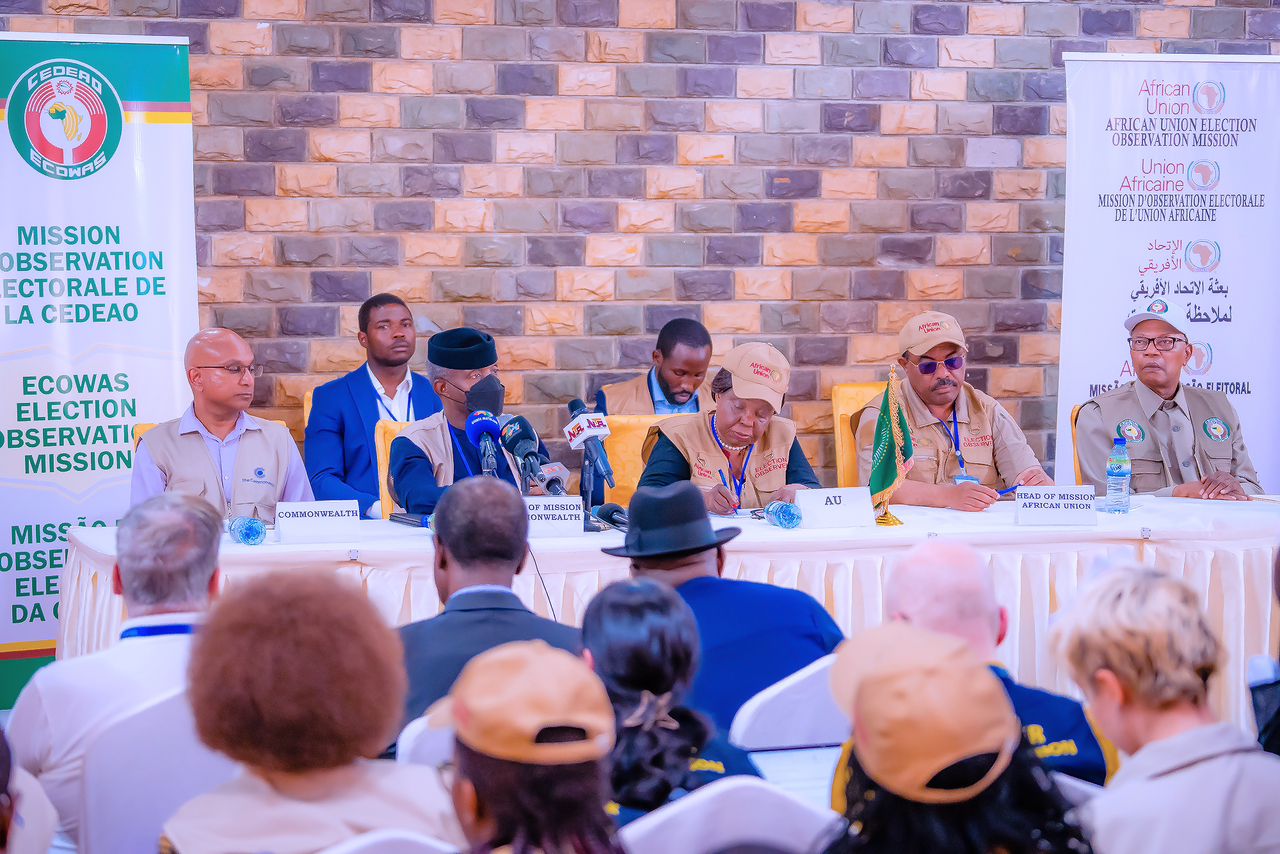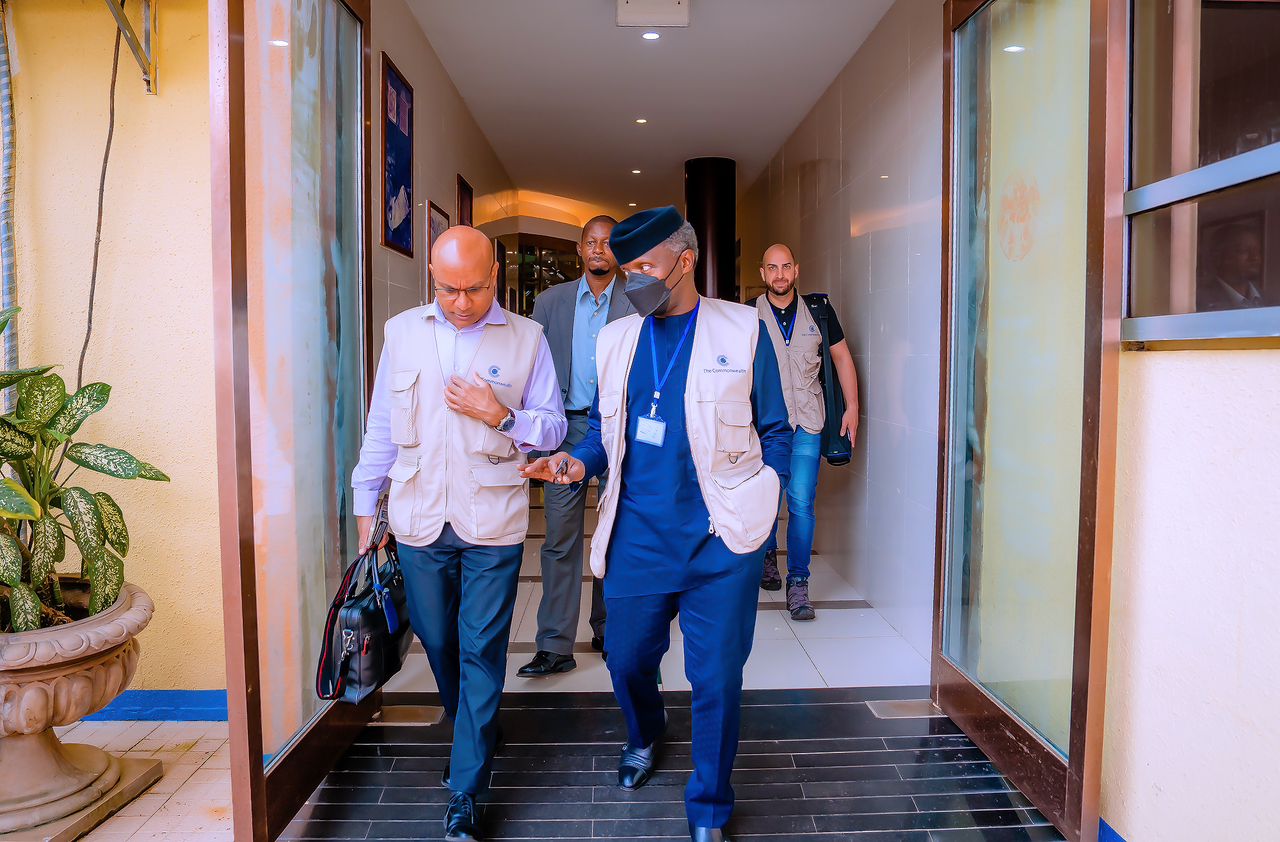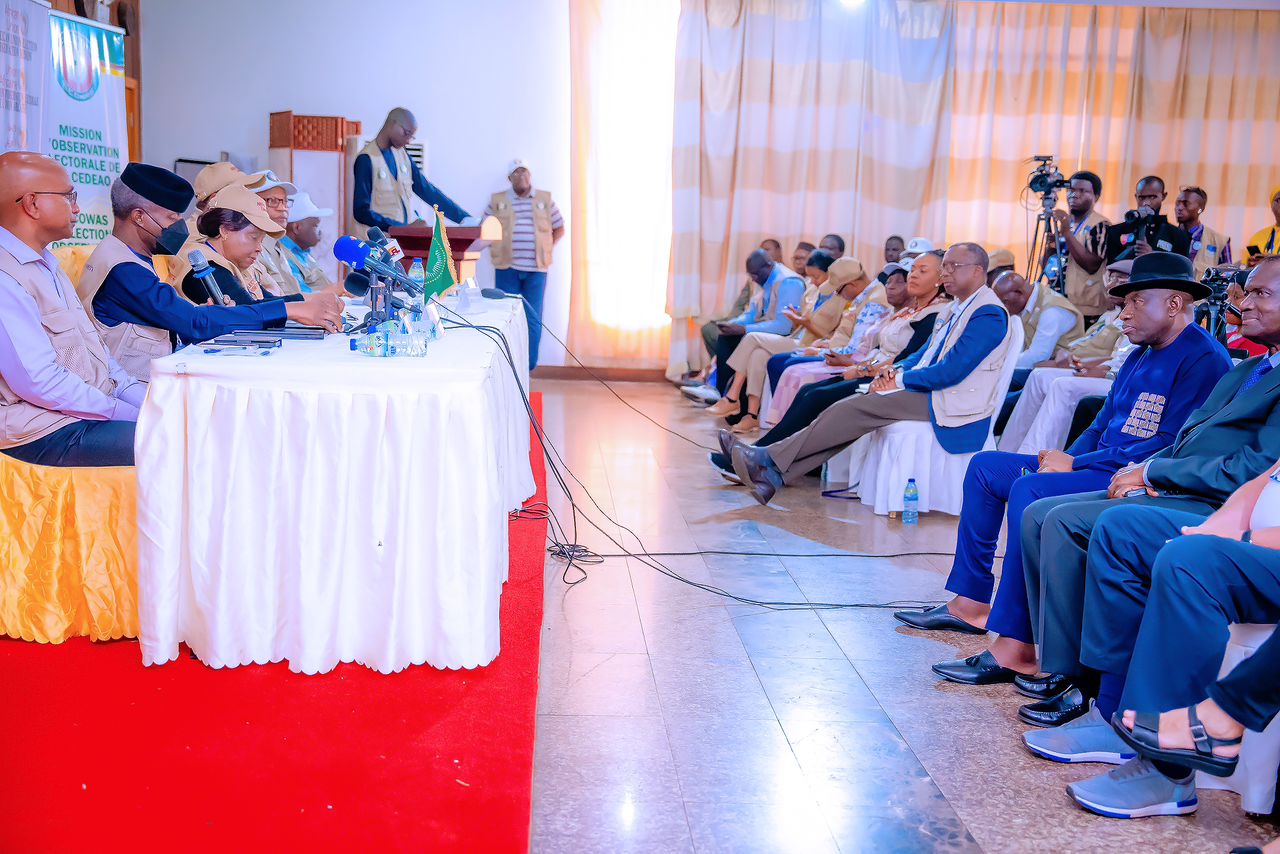2023 Sierra Leone Elections – Interim Statement Of The Commonwealth Observer Group
INTERIM STATEMENT OF THE COMMONWEALTH OBSERVER GROUP BY THE CHAIR, HIS EXCELLENCY, PROF. YEMI OSINBAJO, SAN, GCON, IMMEDIATE PAST VICE PRESIDENT OF NIGERIA, ON 2023 SIERRA LEONE MULTI-TIER ELECTIONS ON THE 26TH OF JUNE 2023, IN FREETOWN, SIERRA LEONE
INTRODUCTION
Good afternoon to you, the people of Sierra Leone, members of the diplomatic corps, members of the media, fellow observers, ladies and gentlemen. Thank you for coming to this Press Conference where I will present the interim observations of the Commonwealth Observer Group on the electoral process. The final report, setting out our full findings on the entire process and our recommendations, will be submitted to the Commonwealth Secretary-General.
The Commonwealth is honoured to have been invited by the Electoral Commission for Sierra Leone to observe these elections. Allow me to recall my remarks at our Arrival Press Conference, noting that the Commonwealth has been an enduring companion of this nation on its extraordinary journey since independence, witnessing the country’s evolution into what it is today. The Commonwealth family continues to stand in solidarity with Sierra Leone in these elections, noting that these elections were the first to be held against a background of some significant changes, including, among others, the introduction of the District Block Proportional Representation System, gender quotas for the nomination of candidates, and a shortened period in which election petitions should be resolved.
The participation of political party leaders and of the flagbearers in the Election Pledge that was facilitated by the Commonwealth held on 25th May 2023 was a testament to a common interest in free, fair and peaceful elections. I commend all involved in the electoral process, especially on election day, for demonstrating their abiding commitment to this democratic spirit. It has indeed been an honour for us to be a part of this important process.
Our Group was constituted by the Commonwealth Secretary-General, The Right Honourable Patricia Scotland KC. It comprises experts drawn from various sectors, including political, legal, media, civil society and electoral bodies from several Commonwealth regions. We arrived in Sierra Leone on 17th June 2023.
On 22nd June, we deployed our teams across the country to observe the electoral environment to gain a comprehensive picture of pre-election day preparations. Prior to our deployment to the regions, we were briefed in Freetown by various stakeholders, including the Electoral Commission for Sierra Leone; presidential and mayoral candidates and representatives of political parties; media professionals; the Independent Media Commission; youth organisations; women forums; representatives of persons with disabilities; security agencies; Commonwealth High Commissioners; the Judiciary; the Human Rights Commission of Sierra Leone; the Sierra Leone Bar Association; the Chamber of Commerce; the Sierra Leone Labour Congress; and various civil society organisations. We also established working relationships and exchanged information with other international observers as well as local citizen observer groups.
KEY FINDINGS
We were impressed by the significant turn-out of voters and the largely peaceful conduct of elections, a testimony to the will of the people to consolidate the democratic gains of Sierra Leone. The eyes of the international community, the development partners and the family of the Commonwealth are on this nation. It was observed that election actors conducted themselves as expected on election day.
Prior to election day, the Electoral Commission for Sierra Leone had provided various assurances of its preparedness and readiness to conduct the elections as scheduled.
While we commend the Electoral Commission of Sierra Leone for managing a largely peaceful election day. We noted reported challenges with respect to communication, transparency and the level of trust in the electoral commission and other key state institutions which are key to the electoral process, such as the judiciary. I will comment on some of these aspects shortly.
The voters were largely peaceful and patient, even with the delayed opening of the polls, which we note with concern was due to the late arrival of the voter register, ballot papers and other sensitive materials in several cases. The electoral staff were professional and conciliatory and for the most part, managed emerging conflicts well.
Notwithstanding a few isolated incidents, the will of the people of Sierra Leone for a democratic process was reflected in the behaviour of those involved in the electoral process on election day, and this is to be commended. Security services were present in most stations visited.
Unfortunately, there were isolated critical incidents, including reported skirmishes, police arrests, attacks on polling officials and political party agents, and harassment of police officers.
We noted that the elections were competitive.
The Legal and Electoral Framework
We note that the Constitution of Sierra Leone (1991) guarantees fundamental democratic and political rights, including the right to vote and participate in regular elections for all.
The Group noted that the 2018 Commonwealth Observer Group had recommended a review of The Public Elections Act 2012, as well as measures to enhance women’s participation in the electoral process. The review and enactment of key legislation in 2022, such as The Public Elections Act and the Gender Equality and Women’s Empowerment Act, was commendable.
Voter Registration
We note the concerns raised by stakeholders about the mid-term census that was conducted in 2021. Ahead of these elections, the Electoral Commission updated the voter register. However, we were informed by stakeholders about issues with respect to access to information provided in the voter register. We will address this further in our final report.
Voter education, communication and outreach
Several stakeholders raised concerns about insufficient communication by the Electoral Commission throughout the electoral process. It was reported that voter education conducted was inadequate, particularly as it relates to the proportional representation system. We recommend that the Electoral Commission considers training all its staff to enhance its strategic communication capabilities, transparency and accountability.
We also recommend the creation of a dedicated funding stream for voter education.
The Campaign
In various briefings by stakeholders, the Group learnt that campaigns were colourful, well-attended and robust. We also learnt that the campaign rallies of major political parties were very competitive and that they were highly visible in various parts of the country. However, we were told in various briefings that there had been restrictions to some campaigning in some districts.
Media
We observed that the media was largely free to operate in the lead-up to elections and on election day. Media regulations and codes of conduct were generally adhered to. However, misinformation and disinformation proliferated across social media on most major platforms as well as on the messaging app WhatsApp, which influenced the pre-election environment.
We commend the efforts made by platforms such as I-verify as well as the Sierra Leone Association of Journalists to address some of these challenges. We encourage further educational and awareness-raising initiatives to equip the population, particularly young people, with the relevant knowledge and skills to identify misinformation and disinformation, as well as be more aware of their harmful impacts.
We also recommend that adequate support and resources be provided to critical bodies such as the Independent Media Commission (IMC) and the Sierra Leone Association of Journalists to carry out their duties to ensure a robust framework and environment in which media can operate.
ELECTION DAY
The environment on Election Day was largely peaceful, though the Group noted some isolated incidents.
Early Voting
We noted that early voting was arranged on 15 June 2023 for pilgrims travelling to Mecca as well as security personnel who were scheduled to work on election day. However, we noted that some security personnel opted to vote on election day itself.
The Group also noted that the announcement was made just 24 hours prior to the date for early voting. There were reports that the list of early voters was not provided to political parties prior to the early voting. Concerns were also expressed about the decision of the Electoral Commission to print the ballot papers for early voting in Sierra Leone, while having ballot papers for the election day on 24th June printed in South Africa.
Pre-poll procedures and opening of polls
On the morning of election day, pre-polling procedures and checks were followed, but sometimes the procedures were not uniformly applied by polling staff. Election day was characterised by some logistical challenges, most notably the late arrival, or non-delivery in some cases, of both non-sensitive and sensitive election materials. As a result, our observers noted the late opening of polls in many polling centres, with delays of about one to three hours in the opening of polls. We noted that the Electoral Commission allowed polling staff to grant pro rata time extensions in some cases where the opening of polls was delayed.
It is recommended that the Electoral Commission review its logistical arrangements for the distribution of materials on the eve of election day. Polling officials and security personnel should be present at safe, conducive locations the night before to receive materials and to ensure readiness for openings on time at the stipulated time.
Conduct of Polls
The electoral staff were generally professional, transparent, conciliatory and for the most part, managed emerging conflicts well. However, we noted varying levels of assimilation of training by the polling staff, as there were a few inconsistencies in the application of procedures. Some examples of these inconsistencies include:
- It was noted that long queues of voters waited patiently for their turn and were calm and orderly. However, there was poor queue management and inadequate signage in some cases, with the use or presence of crowd control tape or queue controllers rare or non-existent.
- We acknowledge that the Electoral Commission made provisions for voter verification, allowing voters without a voter ID to present an alternative form of identification, in accordance with stipulated guidelines. It was observed in some cases, that in spite of being in possession of alternative identification as prescribed by the Electoral Commission, some voters faced difficulties in being allowed to vote.
- The inking process after voting was in some cases applied inconsistently.
- Polling staff did not always communicate effectively when dealing with queries on the process, especially in their interaction with party agents.
We recommend additional training for polling staff, to respond to any challenges that may arise during the conduct of their duties, to minimise such anomalies in the future.
Polling station setup and infrastructure:
The location of polling stations, mainly in schools or in open spaces, necessitated adequate signage, but we noted that some voters struggled to identify their polling stations due to ineffective queue management. While the Electoral Commission had made provision for the size of polling centres to be capped at a maximum of 300 voters, there were nevertheless serious space constraints for some polling stations which need to be addressed for future elections. The facilities at open-space polling stations were inadequate, often failing to provide protection for voters, staff and election materials.
Additionally, party agents and polling staff did not have adequate uniforms and identifiers (badges, name tags). In most cases, there was poor lighting by evening, although some lamps were noted in some areas since the counting went on after dusk and the voting centres often did not have electricity.
The Electoral Commission should review its protocols to ensure that it provides basic facilities for voters and polling staff at polling centres.
Participation and Inclusion
Women and youth were evident in large numbers among voters and polling staff and were unhindered in their ability to cast their ballots. We note, however, that the senior supervisory roles of polling centre manager (PCM) and presiding officer were largely undertaken by men.
Priority voting and Persons with Disabilities (PWDs)
Generally, persons with disabilities, pregnant and lactating women, and senior citizens were accorded priority voting. We noted the availability of tactile ballot units for Persons with Disabilities (PWDs) in some stations. However, we observed some variations in how persons with disabilities (PWDs) were catered for, with respect to access to polling stations.
Party agents
Party agents were present in all polling and tallying centres observed, though varied in numbers and representation. They were punctual in arriving at their polling stations, displaying vigilance as they conducted their duties. While we noted some isolated cases of agitation or dissatisfaction, any disputes were largely resolved satisfactorily with polling staff.
Security
The Group noted the presence of security services at polling centres for the most part, and response to incidents when they occurred. It was also noted that the police and military had cooperated, under the leadership of a national security coordinator and the police, to ensure overall security for election day.
Observer missions
We would like to express our appreciation to all international and national observer groups we met on election day for the cooperation and exchange of views on the unfolding process.
Situation Rooms
As Chairperson, I had the opportunity to visit a number of civil society Situation Rooms, including that of the National Elections Watch, Eminent Women Peace Mediators, the West Africa Network for Peacebuilding (WANEP), the Independent Commission for Peace and National Cohesion, and the Human Rights Commission of Sierra Leone. These initiatives enhance transparency and provide a national perspective on key data emerging from the electoral process, especially on election day. This serves to instil greater confidence in the electoral process, and should therefore be encouraged.
Closing and counting
Counting proceeded smoothly and procedures were largely followed. It was observed that those who were in the queue when polls closed were allowed to vote. It was observed that due process was followed with a high degree of transparency. Polling staff undertaking the count were clear and methodical in the conduct of their duties, and any disputes that we observed were settled amicably in most cases. The Electoral Commission, its polling staff and party agents are commended for this.
The Tallying Process
We are conscious that the tallying process is an ongoing and crucial phase of the electoral process. While we are still observing this process and will provide a thorough assessment in our Final Report, we note with concern, based on our observations and various reports, that there is a lack of clarity around the actual procedure for tallying, leading to charges of lack of transparency. We also noted with concern statements that are being made by some political parties pre-empting the official results announced by the Electoral Commission.
We urge the Electoral Commission to exercise maximum transparency in the days ahead, as its staff finalises the tabulation of votes and prepares to release the final results. We also recommend that results at the polling station level be published to allow for cross-verification by party agents of all political parties, their leaders and supporters.
It is our hope that whatever the outcome of these elections, in the interests of stability, understanding and cooperation, the largely peaceful tenor of the electoral process will prevail.
We, therefore, appeal to all political parties, their supporters and other stakeholders in the electoral process to continue to show utmost restraint and allow the Electoral Commission to discharge their mandate. We urge all to continue upholding their commitment to the electoral pledge with the same spirit of national unity, peace and solidarity.
We urge the Electoral Commission to conduct a thorough post-election review at a suitable time and also encourage consideration for the establishment of appropriate domestic mechanisms to take up recommendations offered by our Group.
We would like to express our appreciation to all stakeholders with whom the Group interacted throughout our time in Sierra Leone, and also extend our appreciation to all international and citizen observer groups that we met on election day for their cooperation and exchange of views.
It is our hope that Sierra Leone will continue to serve as an inspiration for the region, the Commonwealth and indeed, for the rest of the world, as a model post-conflict nation, placing national development and the aspirations of its citizens above all else.
It was a special honour for me and my team to be in Sierra Leone at this important time, and we express our appreciation for your hospitality. We trust that our work will contribute to the strengthening of democracy, good governance and the rule of law in Sierra Leone.
Ends.
SUMMARY OF PRELIMINARY RECOMMENDATIONS
- We recommend that the Electoral Commission considers training all its staff to enhance its strategic communication capabilities, transparency and accountability.
- We also recommend the creation of a dedicated funding stream for voter education.
- We encourage further educational and awareness-raising initiatives to equip the population, particularly young people, with the relevant knowledge and skills to identify misinformation and disinformation, as well as being more aware of their harmful impacts.
- We recommend that proper signage and the list of voters be posted at polling centres.
- We recommend additional training for polling staff, to respond to any challenges that may arise during the conduct of their duties, to minimise such anomalies in the future.
- The Electoral Commission should review its protocols to ensure that it provides basic facilities for voters and polling staff at polling centres.
- These initiatives enhance transparency and provide a national perspective on key data emerging from the electoral process, especially on election day. This serves to instil greater confidence in the electoral process, and should therefore be encouraged.
- We also recommend that results at the polling station level be published to allow for cross-verification by party agents of all political parties, their leaders and supporters.
- We urge the Electoral Commission to exercise maximum transparency in the days ahead, as its staff finalises the tabulation of votes and prepares to release the final results.
- We also recommend that results at the polling station level be published to allow for cross-verification by party agents of all political parties, their leaders and supporters.
- We urge the Electoral Commission to conduct a thorough post-election review at a suitable time and also encourage consideration for the establishment of appropriate domestic mechanisms to take up recommendations offered by our Group.


